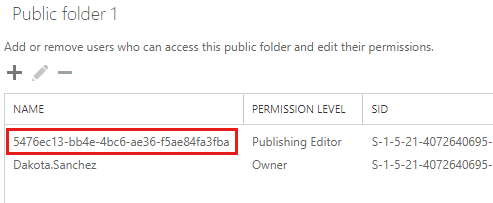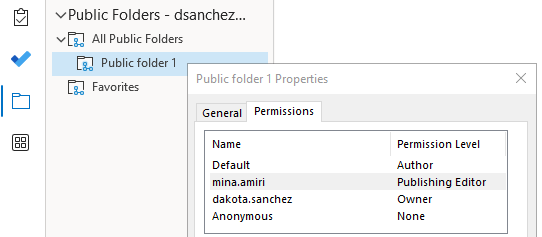Note
Access to this page requires authorization. You can try signing in or changing directories.
Access to this page requires authorization. You can try changing directories.
When you view the list of users in a public folder permissions window in the Exchange Online admin center (EAC), you notice that some users are identified by a GUID in the Name field.
The following example shows a GUID in the Name field of a public folder permissions window.

Cause
To ensure the uniqueness of new recipient objects that are synced from Microsoft Entra ID, Exchange Online replaces the object Name property value with the object ExternalDirectoryObjectId (EDOID) property value. New recipient objects include mailboxes, users, groups, and contacts. For more information, see Change in naming convention of user's Name parameter.
Workaround
To get the names of users who are identified by a GUID in an EAC public folder permissions window, use one of the following methods.
Method 1: Use Exchange Online PowerShell
Use the Get-PublicFolderClientPermission cmdlet to get the names of users:
Get-PublicFolderClientPermission -Identity "<public folder name>" | Format-List User,AccessRightsFor example, the
Get-PublicFolderClientPermission -Identity "\Public Folder 1" | Format-List User,AccessRightscommand might generate the following output:User : Default AccessRights : {Author} User : Anonymous AccessRights : {None} User : mina.amiri AccessRights : {PublishingEditor} User : dakota.sanchez AccessRights : {Owner}
Method 2: Use the Outlook client
Open the properties window for a public folder, and then select the Permissions tab to view the names of users. The following screenshot shows an example of the Permissions tab for a public folder.
